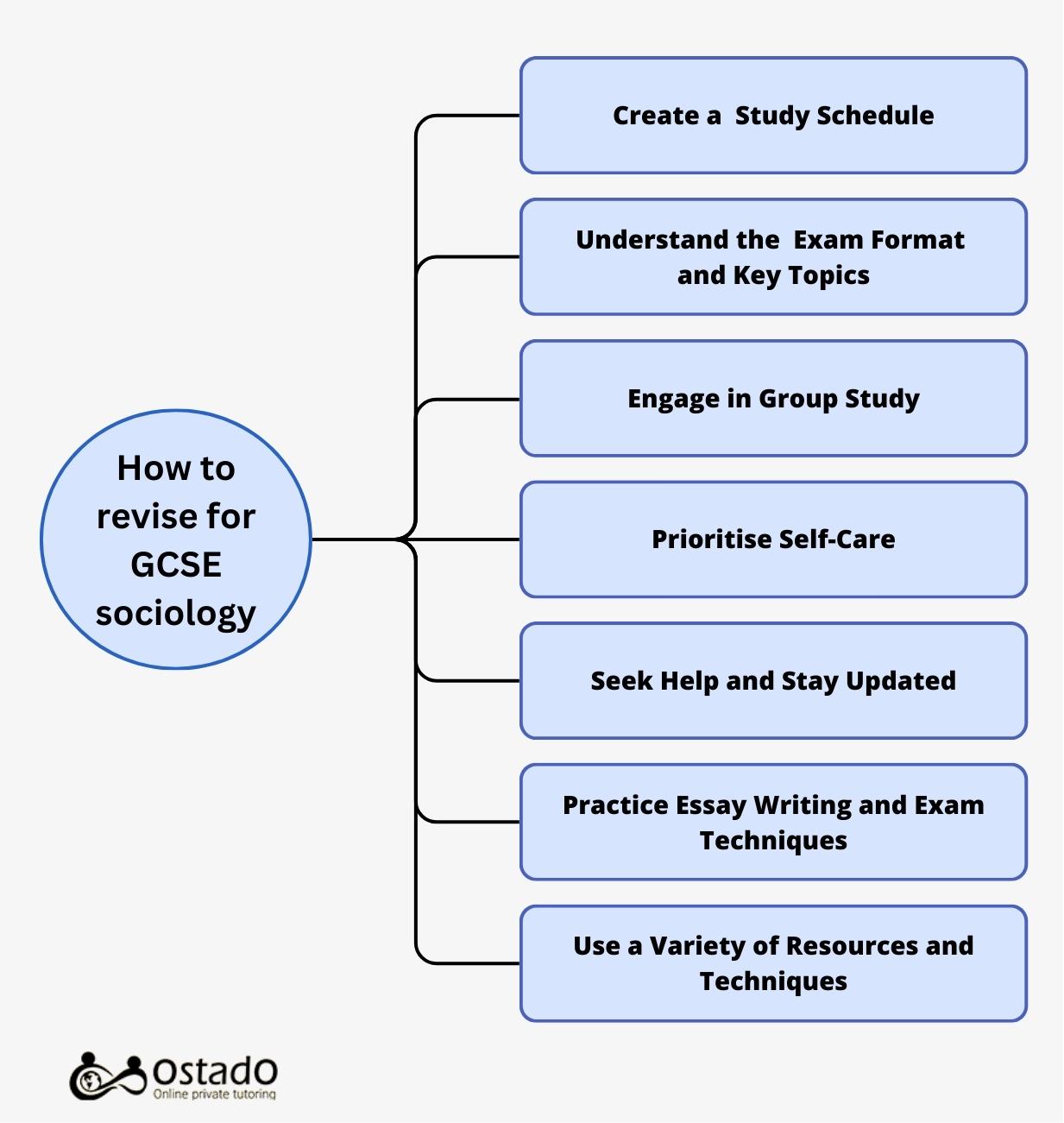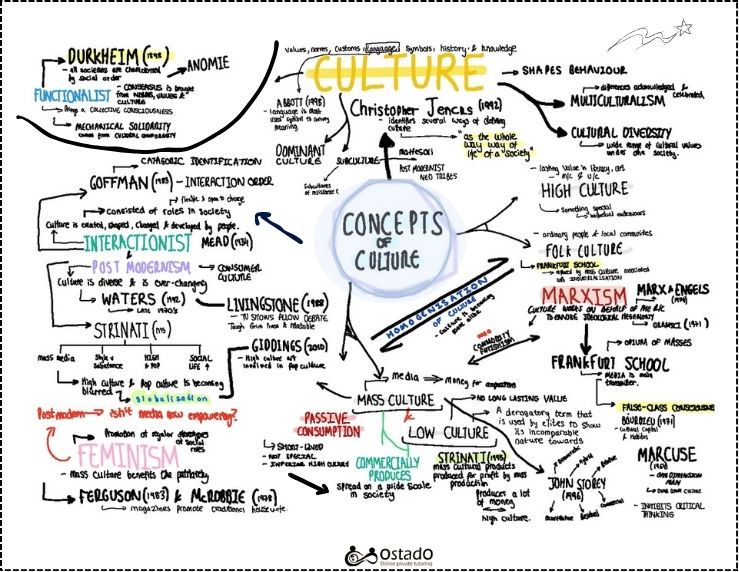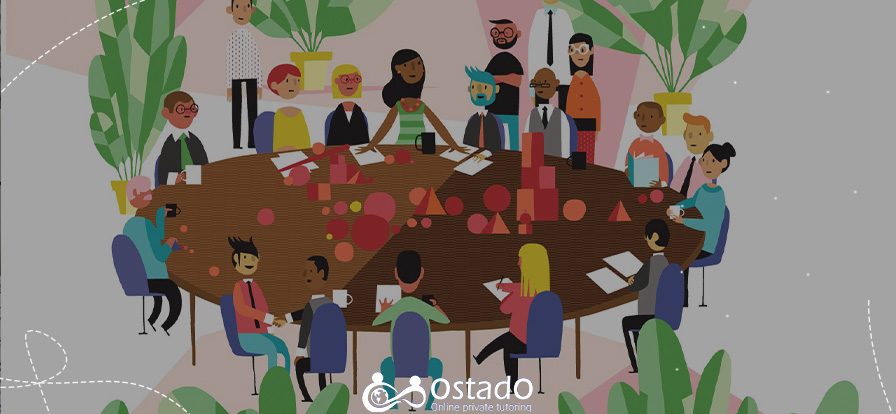The pressure to excel in GCSE Sociology can be intense, considering the volume of the materials and resources you need to revise for the GCSE sociology exam. But don’t let fear hold you back. By implementing a few simple yet powerful techniques, you can conquer your anxieties and achieve the results you deserve.
Core Topics of the GCSE Sociology
Sociology is one of the disciplines which is easy to relate to. The sociological topics you learn clarify how society is formed, structured, organised, and maintained. Sociology explains the theoretical grounds for how you behave in society. In other words, if what people do in society is practice, what you study in sociology is the respective theory. The main topics you learn in sociology include:
- Families and households
- Education
- Crime and deviance
- Social stratification
- Power and authority
- Social inequality
Depending on the exam board, you might encounter other questions on topics such as Mass Media, Youth Subculture, and Social Change.
Sociology Exam Content and Format
The GCSE sociology exam consists of two papers. Each paper covers certain topics mentioned above. The first GCSE sociology paper assesses your knowledge of the sociology of family and education. These questions are about family structures, patterns, and functions in society. It also covers the role of education in the societal structure and how they affect each other.
Additionally, there are some questions about data collection and research methods in sociology, such as surveys, interviews, observations, and experiments.
Topics of GCSE Sociology
The topics covered in the second paper are somewhat more complicated than those in the first. The questions are mainly about crime and deviance, and social stratification. These questions test your knowledge of different sociological and political schools such as Functionalism, Marxism, Interactionism, Feminism, etc.
You may also encounter questions on more advanced concepts in sociology methodologies, such as identifying trends and analysing data.
GCSE Exam Details
The time, total marks, and question types are the same for the two papers. You have 1 hour and 45 minutes to answer the questions for each paper. There are five to seven questions on each paper, but some questions might have two or three parts.
You should expect multiple-choice questions, short-answer questions, and essay questions. If you answer all the questions correctly, you will get 100 marks for each paper. It is worth mentioning that this information is according to the AQA exam board, and there might be slight variations in exams administered by Edexcel and OCR.
How To Revise for Sociology GCSE
The first thing you need is a checklist of sociology topics to be revised. A checklist not only gives you an overall image of the bulk of the revision but also helps you decide how early to start revising to cover all topics.
You can stay on top of GCSE sociology by setting short-term and long-term goals. These GCSE revision timetable templates can help you devise a revision schedule for GCSE sociology and track your progress.

Plan the Sociology GCSE Revision
You must not cram the sociology revision into the last days left for the exams. GCSE exam revision should start at least six months before the exams so that you have enough time to cover all of the GCSE disciplines, including sociology.
The study plan should be comprehensive and realistic. You should identify your strengths and areas of improvement, as well as your available resources (especially time), and set your goals.
How Much Time To Spend on GCSE Sociology Revision
If you start your revision plan early enough, two to three hours of studying is good enough. On weekends and holidays, you can spend more time revising for GCSE exams.
However, if you leave the GCSE revision to the few last weeks left before the exam, you need to spend about seven to eight hours revising for the exam, and I am afraid it is not very fruitful as the stress level goes up as you approach the exam day.
Either way, do not forget to get enough rest. Over-studying ends up in exhaustion, and it can be demotivating.
Plan a Detailed Revision Schedule
Another point in designing a revision schedule is to break down the overall target into monthly, weekly, and daily targets. Pay attention to details like the number of pages that you need to study each hour to keep up with your daily schedule. Take care of the pennies, and the dollars will take care of themselves. This GCSE sociology timetable can help you build your revision plan.
Succeeding in the GCSEs requires meticulous and long-term planning. You need to start revising for the exam at least six months before the exams to be able to cover all the subjects covered in the exam. The planning of the revision process is a lot of work, and it takes too much of your time, but it may not even work out. That is why you should get help from a professional educator to make the revision process effective.
Ostado is a leading tutoring platform in Britain. You can get great advice on GCSE revision from Ostado’s GCSE tutors. You can find your preferred GCSE tutors for the challenging subjects of the GCSE exams, like maths and physics. We will be proud to be part of your success story.
Effective Revision Strategy for Sociology
Frankly, studying can be boring when all you can do is keep reading one lesson after another. You should integrate some activities into your study habits to make it more interactive.
Make Studying an Interactive Activity
My favourite way of making studying more interesting is using highlighter pens. I also have a universal colour coding system; I use green highlighter for keywords, yellow for a larger body of text, blue for names and dates, and pink for new vocabulary and terms I come across. Moreover, when I have the time, I take notes and write summaries of the materials I study.

If you are more artistic than me, you can also use mind maps to visualise the topics. It takes time to design mind maps, but they make future reviews very easy. Sociology is a web of interconnected ideas, and mind maps are great tools for demonstrating conceptual linkages.
Integrate Technology Into Your Learning Habit
My suggestion here is to integrate digital tools into the revision process. If you have not already switched to ebooks, it is about time to do so. You can do whatever you want with a PDF file on your tablet or smartphone. You can add screenshots and notes to these files, highlight the text, and many more features.
The best thing I like about ebooks is that I can look for the information I need more easily by using the search (Ctrl+F) option. Here are some PDF practice papers you can download and use on your table or laptop. Go green!
Aside from the fact that it makes learning more engaging, you have a better hands-on experience with ebooks. For example, you have access to virtually unlimited resources on your tablet, and you can use it anywhere (e.g., on the bus, lying on the bed, etc.)
But there is one thing you should control. It is hard to ignore a notification you receive on your tablet saying you have a “new friend request.” So, use the “do not disturb” feature on your tablet or disable or mute the notifications to avoid distractions.
ِUse Different Resources for GCSE Sociology Revision
Another thing you can do to make the revision process more engaging is diversify your resources. Do not suffice with textbooks. There are many YouTube channels that can facilitate the revision process, especially for visual and auditory learners.
All Sociology is one of the best channels I came across when I was looking for online sociology resources. For kinesthetic learners, a combination of mental and physical activities might be more practical. For instance, they can go bicycling while listening to some GCSE sociology podcasts, such as GCSE Sociology (AQA): Podcasts (All Topics).
The table below lists other resources you can use to revise for GCSE sociology. Select resources based on the time you can dedicate to sociology revision and your learning needs and style. Using different resources can gain you an in-depth knowledge of the subject and maximise your preparation for the exam.
|
Top GCSE Sociology Revision Resources |
||
| Resource Type | Name | Description |
| Books | “AQA GCSE Sociology” by Pauline Wilson and Allan Kidd | Comprehensive coverage of the AQA syllabus with practice questions and examples. |
| “Revise AQA GCSE (9-1) Sociology Revision Guide” by Steve Chapman | Summarised topics and exam-style questions, ideal for final revision. | |
| “My Revision Notes: AQA GCSE (9-1) Sociology” by Ian Woodfield | Key term definitions, summaries, and questions for structured revision. | |
| Videos | Seneca Learning Sociology Revision | Short, animated videos covering Sociology topics interactively. |
| The Whole of AQA GCSE Sociology | Engaging Sociology content with clarity and humour. | |
| Podcasts | Revise – GCSE Sociology | Conversational podcast covering GCSE Sociology topics. |
| The Sociology Satfroom | Real-world sociological applications for GCSE students. | |
| Websites | Seneca Learning | An interactive platform covering the Sociology curriculum. |
| BBC Bitesize GCSE Sociology | Summaries, videos, and quizzes tailored for GCSE Sociology. | |
| Apps | Quizlet | Create and use flashcards to memorise key terms and theories. |
| Seneca Learning App | Access Seneca’s interactive learning on the go. | |
| Other Resources | Mind Maps (MindMeister, Coggle) | Visual tool for organising Sociology topics and making connections. |
| Past Papers (AQA, OCR websites) | Exam practice to familiarise with question styles and formats. | |
Use Practice Papers and Past Papers
Past GCSE sociology papers can help you assess your knowledge, identify gaps, and determine what you need to focus on. You can use past papers on a weekly or monthly basis to check your progress. The best way to use past papers is to set a time limit and do your best to simulate the actual exam conditions. By setting a time limit, you will get better at time management, which is a key test-taking skill.
“Understanding a question is half an answer.” Before you start answering the question, make sure you understand what you are required to do. In addition, when you want to answer essay questions, which are allocated lots of marks, you should plan your answer first to make sure you address all parts of the question.
Sociology is one of the palpable subjects students study at school because they can find instances of what they learn at school in real life. As a result, some students consider this discipline to be easy. However, the intensity of topics in sociology might surprise you, and in order to achieve high grades in GCSE sociology, you should have a detailed and personalised plan. You can get help from Ostado’s tutor to help you with this task and practise past papers with you to maximise your readiness for the GCSE exams.
Key Takeaways
- Plan a personalised revision schedule.
- Make studying more interesting based on your learning style.
- Incorporate appropriate study techniques into your study habits.
- Use highlighting, summarising, outlining, and mind mapping to diversify your revision schedule.
- Use different resources and practise past papers to maximise readiness in the exam session.
FAQs - GCSE Sociology Revision

